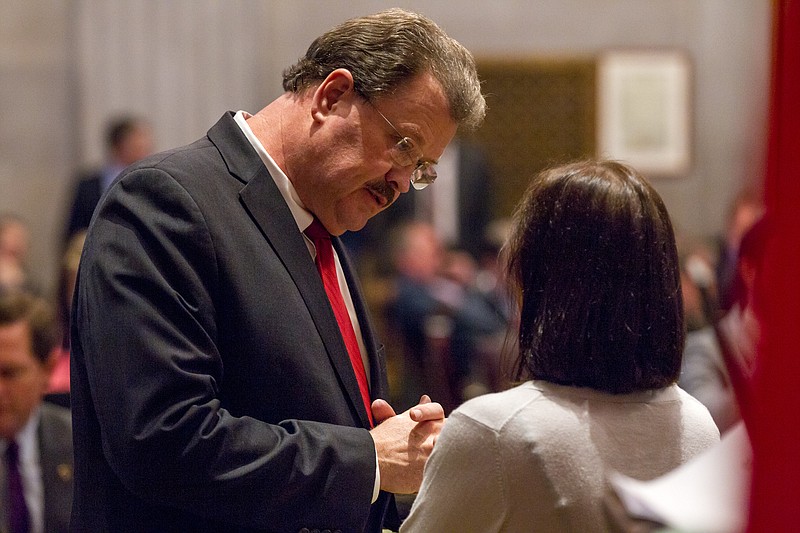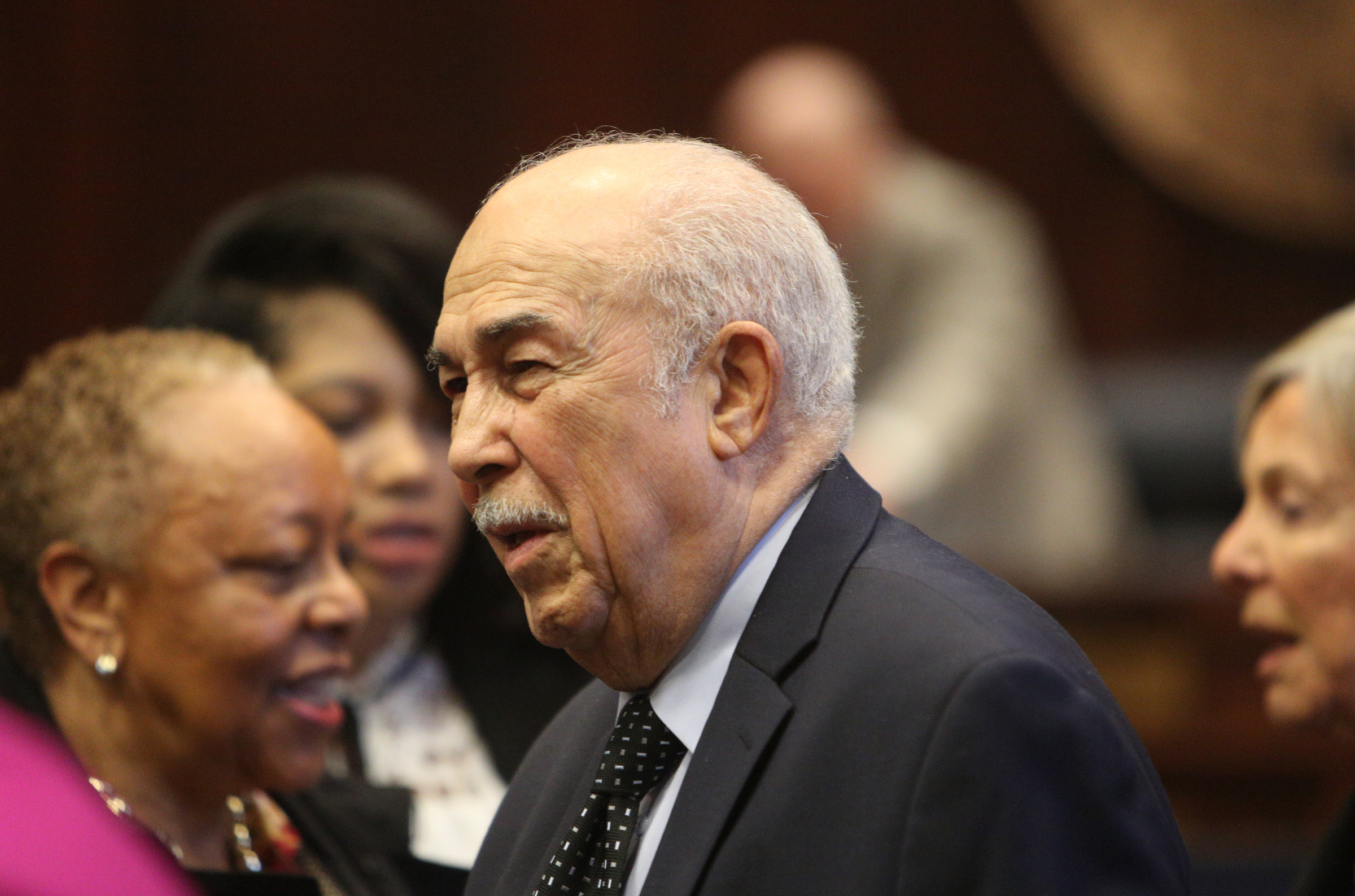NASHVILLE — When Tennessee voters head to the polls Nov. 8, they will decide whether to remove from the state constitution a 226-year-old ban on members of the clergy serving in the General Assembly -- a ban that has not been enforced, as it's been found in violation of the U.S. Constitution.
"Whereas ministers of the Gospel are by their profession, dedicated to God and the care of souls, and ought not to be diverted from the great duties of their functions," says the clause in question, "therefore, no minister of the Gospel, or priest of any denomination whatever, shall be eligible to a seat in either House of the Legislature."
It was struck down by the U.S. Supreme Court in 1978 in a case brought by the Rev. Paul McDaniel, a minister from Chattanooga. McDaniel was running to serve as a delegate to Tennessee's 1977 constitutional convention. His opponent, attorney Selma Cash Paty, invoked the ban in an effort to keep him off the ballot.
Then-Hamilton County Chancellor Herschel Franks in 1977 ruled the state provision unconstitutional, allowing McDaniel to run. Although the Tennessee Supreme Court later reversed Franks, the U.S. Supreme Court settled the matter for all time in an 8-0 decision that struck down the nation's last state prohibition on clergy serving in elective office.
After serving in the convention, McDaniel went on to win election to the Hamilton County Commission, where he served for years.
In a Chattanooga Times Free Press interview last year prior to his death, McDaniel said he favored the effort to ask voters to strike the language.
"I think it's good to take it out of the constitution," McDaniel said.
Efforts to reach Sen. Mark Pody, R-Lebanon, who sponsored the resolution to put the measure before voters this year, were unsuccessful Friday.
At least three ministers or pastors serve in the Tennessee General Assembly. Among them is Rep. Johnny Shaw, D-Boliver, who favors removing the defunct resolution.
"When I started 22 years ago, that was brought up to say I couldn't serve because ordained ministers could not serve in the legislature," Shaw said Friday in a phone interview. "However, it was not so. ... They tried to bring it up against me but, of course, it didn't work."
Shaw recalled being told at the time many lawmakers were full or part-time ministers or pastors. He said he thinks it's a "great idea" to strike the defunct prohibition from the state constitution.
"Who else is better then true men of God to really serve, become public servants for the people and represent them," Shaw said. "At least, let me put it this way, we should stay on track more than anybody else when it comes to what's doing right and wrong."
Shaw, however, said he sees a difference his ministerial role and governmental role.
"We get sworn in as legislators to uphold the constitution of Tennessee and the United States. And what I mean by that is to apply the law equally and not to be injurious against any of our constituents," Shaw said. "Now, as ordained ministers of God, when we preach on Sunday, we are saying, 'What sayeth the Lord.' I think that's where the distinction is made.
"However, if you are a believer, and it's in your heart to be a believer, I think you're going to make good decisions even when you're working for the state," Shaw said. "I think you're going to be fair and honest with all your constituents and do the right thing."
Shaw said he's promoting approval to listeners of his rural West Tennessee gospel radio station and believes it will pass.
The two other lawmakers who are ministers or pastors are Rep. Harold Love Jr., a Nashville Democrat, and Rep. Jerry Sexton, R-Bean Station.
Official book
Sexton, also a businessman, crusaded for years to make the Bible the official book of Tennessee through a resolution. It was deemed unconstitutional in 2015 by then-Tennessee Attorney General Herbert Slatery in a legal opinion stating it amounted to an endorsement by government of a religion.
That didn't stop Sexton or lawmakers from passing it in 2016, but then-Gov. Bill Haslam, a Republican and devout Christian, vetoed the measure, saying it trivializes the Bible, which he considered a sacred text.
His fellow Republicans' effort to override the veto failed.
Then Sexton pressed the issue again. It won approval last year in the House. Sexton and Shaw squared off during the debate, taking opposing sides on the issue as Sexton urged colleagues to pass it while Shaw called on colleagues to reject it. It passed the GOP-controlled House. But the Sexton bill never moved in the Republican-led Senate, where Republican Senate Speaker Randy McNally of Oak Ridge and others had concerns.
Shaw said he believes Tennessee voters will approve removing the 18th century defunct constitutional ban on the language aimed at ministers, pastors and preachers from serving in elective office.
"I really think it's going to be passed because, again, ministers have been serving," Shaw said. "If I had to choose between who I wanted to serve me, I certainly would choose a minister over someone who maybe is not a believer.
"Now, I'm saying this, I've seen some ministers to do some very odd things when it comes to their relationship with God and what they do in terms of being legislators," Shaw added. "Because I do remember Jerry Sexton, he made an effort to make the Bible the state book, which I thought was not right because that's forcing religion upon people who may or may not want it. But I didn't think that was a good idea."
But, he said, "Overall, I think ministers would do a better job of serving and being honest and fair about legislation."
Court ruling
In the U.S. Supreme Court's 1978 decision in the Chattanooga case, then-Chief Justice Warren Burger wrote the disqualification of ministers from legislative office was a carryover from England. There, the practice of excluding clergy from the House of Commons was justified on several grounds, including preventing dual officeholding in a nation with an official state religion where a church official previously could be appointed minister by the king, Burger wrote.
Another factor there was a belief that a minister or deacon should devote himself to his "sacred calling" rather than to "such mundane activities as were appropriate to a member of the House of Commons," according to Burger. And, after 1533, to prevent ministers subject to the king's powers over the clergy from using membership in the House of Commons "to diminish its independence by increasing the influence of the king and the nobility."
In order for any constitutional amendment to pass in Tennessee, two things must occur. The first is the amendment must get more yes votes than no votes. The second is that the number of yes votes must be a majority of the total votes cast in the gubernatorial election.
Early voting in the Nov. 8 election begins Oct. 19 and goes through Nov. 3, excluding Sundays.
Four amendments
When Tennesseans go to the polls this fall, they will be asked to consider four amendments to the Tennessee Constitution. The amendments are:
— Constitutional Amendment 1: The amendment enshrines Tennessee’s existing “right to work” statute in the state Constitution’s Article XI by adding this language:
“It is unlawful for any person, corporation, association, or this state or its political subdivisions to deny or attempt to deny employment to any person by reason of the person’s membership in, affiliation with, resignation from, or refusal to join or affiliate with any labor union or employee organization.”
— Constitutional Amendment 2: This amendment would add to Article III, Section 12 of the Tennessee Constitution a process for the temporary exercise of the powers and duties of the governor by the speaker of the Senate — or the speaker of the House if there is no speaker of the Senate in office — when the governor is unable to discharge the powers and duties of the office of governor. While a speaker is temporarily discharging the powers and duties of the governor, the speaker would not be required to resign as speaker or to resign as a member of the legislature; but the speaker would not be able to preside as speaker or vote as a member of the legislature.
- Constitutional Amendment 3: This amendment would change the current language in Article I, Section 33 of the Tennessee Constitution, which says that slavery and involuntary servitude, except as punishment for a person who has been duly convicted of crime, are forever prohibited in this state. The amendment would delete this current language and replace it with the following language: “Slavery and involuntary servitude are forever prohibited. Nothing in this section shall prohibit an inmate from working when the inmate has been duly convicted of a crime.”
- Amendment 4: This amendment would delete Article IX, Section 1 of the Tennessee Constitution, which prohibits ministers of the gospel and priests of any denomination from holding a seat in either chamber of the legislature.
Source: Tennessee secretary of state
Contact Andy Sher at asher@timesfreepress.com. Follow him on Twitter @AndySher1.

